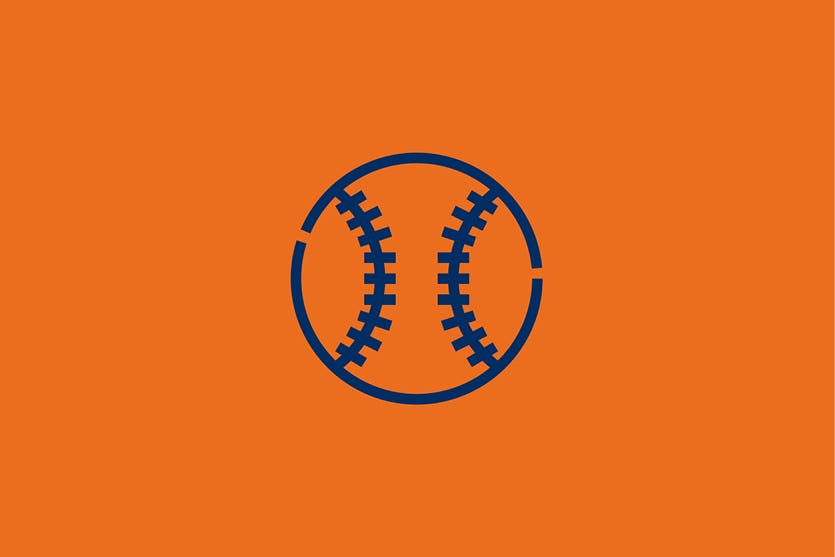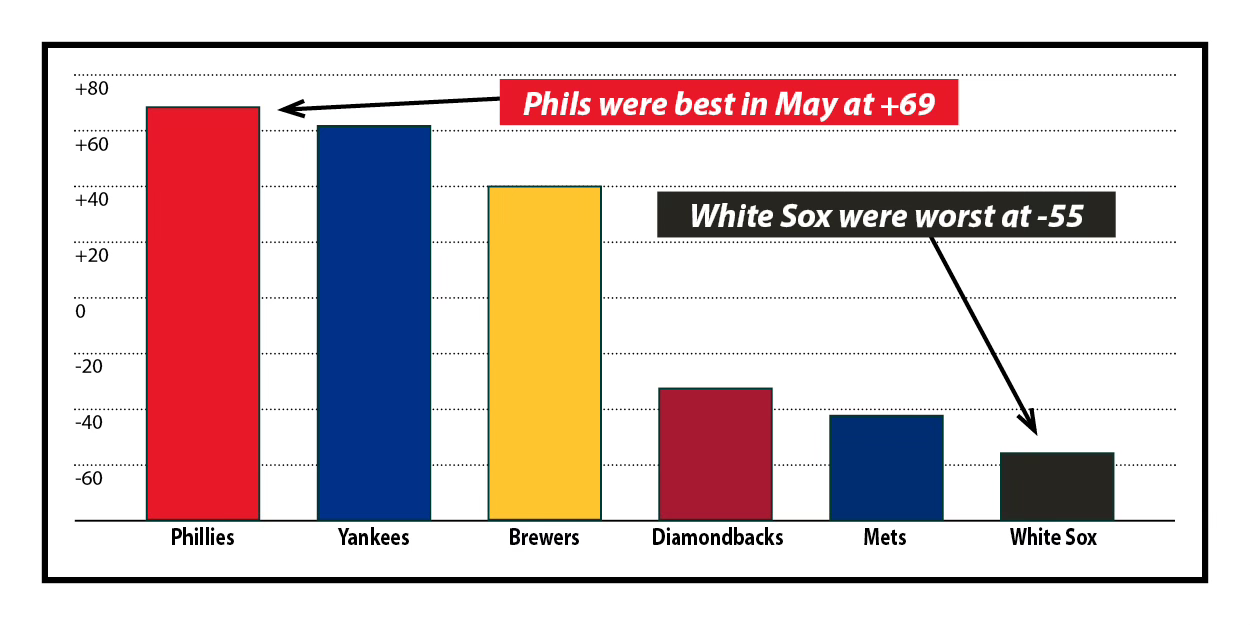[ad_1]
Aaron Judge struck out four times in four at-bats on April 20, and the New York fans did what New York fans do. They booed him.
The Yankees center fielder was mired in a slump, batting .180 over the first three weeks of the 2024 season. His three home runs were overwhelmed by his 27 strikeouts. Never mind that Judge had blasted 138 homers over the previous three years. He looked terrible in April 2024, and that’s all that mattered to the onlookers in Yankee Stadium.
Those boos turned to cheers in May.
Judge smashed 14 home runs and batted .367 last month. He piled up an overall base value (OBV) of plus-74 in May, indicating that he reached 74 more bases (through hits, walks, hit-by-pitches, steals, and sacrifices) than the typical big-league batter would have attained under the same circumstances.
Judge’s OBV was far and away the best in the majors last month. Jose Ramirez of the Cleveland Guardians was second in the American League with an OBV of plus-41. Nobody in the National League did better than Shohei Ohtani of the Los Angeles Dodgers at plus-32.
These were last month’s top batters in both leagues:
1. Aaron Judge, Yankees, OBV 74
2. Jose Ramirez, Guardians, OBV 41
3. David Fry, Guardians, OBV 38
4. Corey Seager, Rangers, OBV 34
4. Kyle Tucker, Astros, OBV 34
6. Bobby Witt Jr., Royals, OBV 30
7. Brent Rooker, Athletics, OBV 29
8. Juan Soto, Yankees, OBV 28
9. Kevin Pillar, Angels, OBV 26
10. Gunnar Henderson, Orioles, OBV 24
1. Shohei Ohtani, Dodgers, OBV 32
2. Bryce Harper, Phillies, OBV 31
3. Kyle Schwarber, Phillies, OBV 25
4. Marcell Ozuna, Braves, OBV 23
5. Joey Ortiz, Brewers, OBV 22
5. Jurickson Profar, Padres, OBV 22
7. Edmundo Sosa, Phillies, OBV 20
8. Joc Pederson, Diamondbacks, OBV 19
8. Bryson Stott, Phillies, OBV 19
10. Nolan Gorman, Cardinals, OBV 18
10. LaMonte Wade Jr., Giants, OBV 18
10. Christian Yelich, Brewers, OBV 18
The flip side of OBV — a negative number — is a sign that a batter is ensnared in a horrible slump.
That’s certainly the case for Vaughn Grissom, a second baseman for the Red Sox. He started 22 games for Boston last month, batting only .150 with just one extra-base hit (a double). His OBV for May was minus-27, which means that he reached 27 fewer bases than the typical major leaguer would have piled up in the same conditions.
Grissom’s overall base value was the worst in either league last month. CJ Abrams of the Washington Nationals was the tailender in the National League at minus-23.
Here are the breakdowns:
1. Vaughn Grissom, Red Sox, OBV -27
2. Justin Turner, Blue Jays, OBV -26
3. Andrew Benintendi, White Sox, OBV -25
3. Christian Vazquez, Twins, OBV -25
3. Javier Baez, Tigers, OBV -25
6. Yainer Diaz, Astros, OBV -24
7. Martín Maldonado, White Sox, OBV -21
8. Alex Jackson, Rays, OBV -18
8. Cedric Mullins, Orioles, OBV -18
10. Jose Altuve, Astros, OBV -17
1. CJ Abrams, Nationals, OBV -23
2. Tim Anderson, Marlins, OBV -21
3. Jake Burger, Marlins, OBV -20
3. Lourdes Gurriel Jr., Daimondbacks, OBV -20
3. Rowdy Tellez, Pirates, OBV -20
6. Mike Ford, Reds, OBV -18
6. Orlando Arcia, Braves, OBV -18
8. Andy Pages, Dodgers, OBV -17
9. Michael Harris II, Braves, OBV -16
10. Keibert Ruiz, Nationals, OBV -15
10. Michael Taylor, Pirates, OBV -15
The Philadelphia Phillies powered their way through May. They won 20 of 27 games last month, firmly establishing themselves as the frontrunners in the National League East.
The Phils trailed the Atlanta Braves by half a game on the morning of May 1, but the tables turned — and decisively so — over the next four and a half weeks. Philadelphia held a 6.5-game lead over Atlanta at daybreak on June 1. The other three clubs in the NL East were even farther behind, mired below .500.
And it wasn’t just that the Phils won. They won big. Philadelphia outscored its May opponents by a combined score of 156-87. The run differential of plus-69 for the month was the largest for any team in the majors.
The following graph shows the three teams with the best differentials in May — and the three with the worst. The Chicago White Sox finished last at minus-55. It’s no surprise that their record for the month was a dismal 9-19.
A new installment will arrive in your email each Tuesday morning
It may seem hard to believe, but we’re actually in the midst of the 25th season of the 21st century. That means we’re almost a quarter of the way through.
That’s a workable pretext for this week’s quiz, which is focused on the performances of the 30 big-league clubs over the past 24 seasons (2000-2023). Scroll to the bottom of this newsletter for the answers.
1. Which franchise has won the most world titles this century?
A. Boston Red Sox
B. Houston Astros
C. New York Yankees
D. San Francisco Giants
2. Which club has secured the most league championships since 2000?
A. Boston Red Sox
B. Houston Astros
C. New York Yankees
D. San Francisco Giants
3. Which team has qualified for the playoffs most frequently in the 21st century?
A. Boston Red Sox
B. Houston Astros
C. New York Yankees
D. San Francisco Giants
4. Which team has racked up the highest cumulative winning percentage over the past 24 regular seasons?
A. Atlanta Braves
B. Los Angeles Dodgers
C. New York Yankees
D. St. Louis Cardinals
5. And which club has posted the lowest cumulative winning percentage?
A. Baltimore Orioles
B. Colorado Rockies
C. Kansas City Royals
D. Pittsburgh Pirates
Manny Machado, if he stays healthy, will notch the 1,000th RBI of his career later this season. Four other stars are poised to join him in quadruple digits, provided they can stay on (or get back to) the field and maintain (or regain) their form: Jose Abreu, Anthony Rizzo, Mike Trout, and Bryce Harper.
Seven active players have driven home more than 1,000 runs in their careers, topped by Freddie Freeman, who had 1,176 RBIs as of June 1. Machado is eighth on the active list with 973 runs batted in, just 27 short of the target.
But everybody is far, far away from the all-time record. Freeman is the only present-day batter who is even halfway to Henry Aaron’s total of 2,297 RBIs.
Here’s a list of the active players who had at least 900 runs batted in (as of June 1), according to Baseball Reference:
1. Freddie Freeman (15 seasons), RBI 1,176
2. Paul Goldschmidt (14 seasons), RBI 1,144
3. Nolan Arenado (12 seasons), RBI 1,087
4. Andrew McCutchen (16 seasons), RBI 1,064
5. Giancarlo Stanton (15 seasons), RBI 1,060
6. Carlos Santana (15 seasons), RBI 1,034
7. J.D. Martinez (14 seasons), RBI 1,016
8. Manny Machado (13 seasons), RBI 973
9. Jose Abreu (11 seasons), RBI 957
10. Anthony Rizzo (14 seasons), RBI 955
11. Mike Trout (14 seasons), RBI 954
12. Bryce Harper (13 seasons), RBI 931
The 1984 Detroit Tigers — hailed as the greatest team of baseball’s Modern Era (1961 to the present) — seemed depressingly average on this week 40 years ago.
The Tigers split their six games between May 28 and June 3, 1984. They took two of three from the Oakland A’s, then lost two of three to the Baltimore Orioles.
Manager Sparky Anderson remained upbeat despite the sluggish week. Anderson said that he had been swamped by mail — especially from young fans — ever since the Tigers bolted into first place at the start of the season. “Kids are more excited about what we’re doing than who will run for president,” he laughed.
Detroit’s record at the end of the week was still a breathtaking 38-11 for a .776 winning percentage. But the pesky Blue Jays remained on their heels. Toronto, which had the second-best record in the major leagues (34-16), was just four and a half games behind the Tigers in the American League East on the morning of June 4.
The 1962 Mets were the complete reverse of the ’84 Tigers. The New Yorkers would suffer 120 defeats by the end of the season, the most losses for any club in the Modern Era.
They played true to form from May 28 to June 3, 1962, losing all seven games on their schedule, three to the Los Angeles Dodgers and four to the San Francisco Giants. That pushed the Mets’ losing streak to 15 games. They hadn’t won since a May 20 doubleheader sweep of the Milwaukee Braves.
The only positive note was the attendance during the week-long homestand, which featured a pair of former local teams, the ex-Brooklyn Dodgers and ex-New York Giants. More than 34,000 fans trooped to the decrepit Polo Grounds on four occasions during the week, topped by 55,700 for a doubleheader between the Mets and Dodgers.
“This crowd is the most amazing thing I ever heard of, and I go back to 1921 in New York,” raved Mets manager Casey Stengel.
New York’s record prior to the games of June 4 was a pitiful 12-34. The Mets were mired in last place in the National League, already 23 games behind the first-place Giants.
1-A. (The Red Sox have won four world championships — 2004, 2007, 2013, and 2018. The Giants are next this century with three titles.)
2-B. (The Astros were National League champs in 2005, then shifted to the American League, where they earned top honors in 2017, 2019, 2021, and 2022. That adds up to five league titles since the turn of the century, though only two were followed by World Series triumphs.)
3-C. (The Yankees have made 19 postseason appearances during the 24-year stretch, falling short only in 2008, 2013, 2014, 2016, and 2023.)
4-C. (The Yankees lead the way with an overall percentage of .580, followed by the Dodgers at .566.)
5-C. (The Royals are saddled with the worst 24-year record, .436, with the Pirates coming next at .447.)
[ad_2]
Source link







